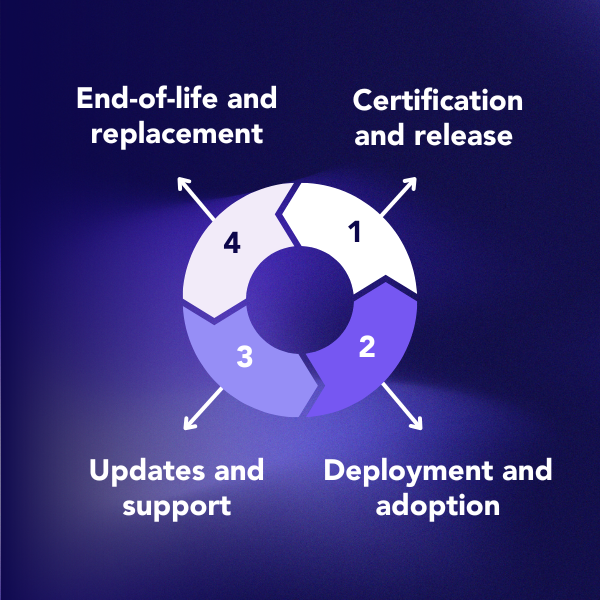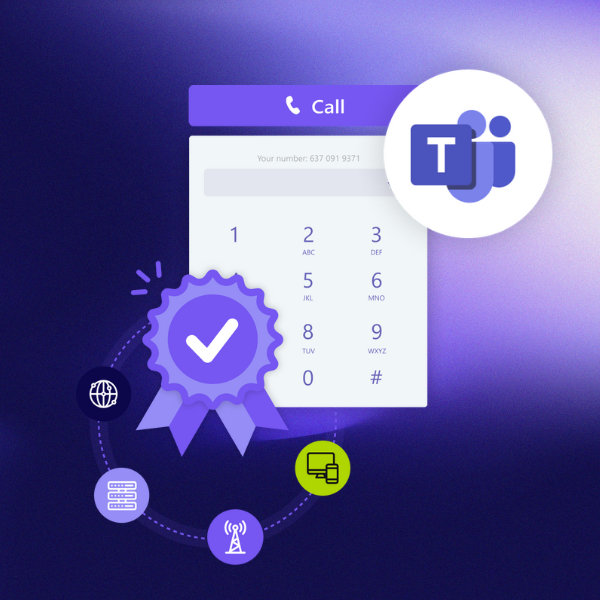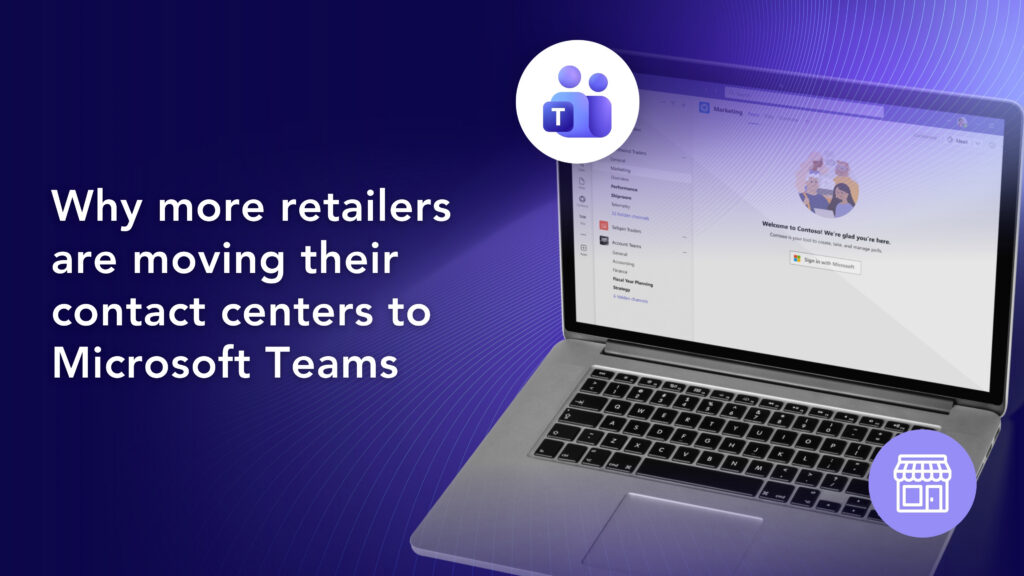Microsoft Teams has quickly become the go-to solution for voice, video, and all types of collaboration.
This ongoing shift has only emphasized the importance of communications hardware being Internet-connected and compatible with Teams.
Microsoft offers a certification program for devices designed to work with Teams to ensure a seamless user experience across all devices. Understanding how this process works and choosing the right Teams-certified devices can be intimidating initially, but it doesn’t have to be.
Learn how Teams certification works, the types of hardware Microsoft certifies, and how to equip your employees with everything they need to communicate effectively.
What is Microsoft Teams certification?
A device that’s undergone the Teams certification process meets Microsoft’s stringent audio quality, reliability, and security requirements, ensuring compatibility with Teams’ calling and meeting functions.
Various hardware, such as desk phones, headsets, speakers, intercoms, and conferencing systems, require Teams certification. Once certified, these devices tell businesses that they have been optimized for performance, ease of deployment, and a consistent user experience.
Buying a certified device gives businesses confidence that the device will work with Teams as expected, receive continuous updates, and stay compatible with evolving Teams features.
Device life cycle
The life cycle of a Teams-certified device follows a structured process to ensure continuous reliability and security. Let’s quickly explore this life cycle:
- Certification and release: Manufacturers work closely with Microsoft to test and certify devices. Once certified, they are added to the official Microsoft Teams devices list, guaranteeing they meet high-performance, security, and interoperability standards.
- Deployment and adoption: Organizations purchase and deploy devices according to their communication needs. IT teams configure these devices for use to ensure seamless integration with existing Teams infrastructure and workflows.
- Updates and support: Microsoft and device vendors regularly release updates to improve performance, patch security vulnerabilities, and introduce new features. These updates are essential for maintaining functionality and addressing potential cybersecurity threats.
- End-of-life and replacement: Eventually, older devices reach their end-of-life (EOL) status, which means they’ll no

longer receive updates. Businesses must then replace them with newer, certified models to maintain security, compliance, and continued compatibility with Teams features.
Management system capabilities
An effective management system will allow IT to streamline communication-related tasks like troubleshooting issues, enhancing security, and maintaining compliance. Additionally, IT will be ready to replace devices with expired Teams certification.
A few other capabilities that your system will require are:
- Organizations should use the Microsoft Teams Admin Center to configure and monitor devices remotely, reducing the need for on-site IT troubleshooting.
- Automatic firmware updates can be configured to keep all devices working as expected and secure.
- Implement role-based access controls to prevent unauthorized changes to device settings, ensuring a secure and controlled IT environment.
Migrating from Direct Routing solutions to Operator Connect
Moving from Direct Routing tends to be slightly more complex, though this depends on your current provider and setup. Due to the nature of Direct Routing, you’ll likely also need to use PowerShell. We’ve provided a general overview of the process below which should apply to most providers.
Note that these instructions assume your Direct Routing provider and Operator Connect provider are different telecommunications companies. However, some vendors offer both services. If you’re staying with the same provider, contact them for specific migration instructions.
Leading vendors of Teams-certified hardware to consider
Several leading technology vendors manufacture Teams-certified devices, ensuring various options for different business needs. A few of the top vendors to consider are:
- Yealink: This trusted vendor offers a variety of desk phones, speakerphones, and video conferencing systems with excellent audio quality and seamless integration with Teams.
- Poly: Previously known as Polycom and Plantronics, Poly has combined decades of experience in manufacturing commercial communication hardware. Many of their devices are Teams-certified.
- AudioCodes: This manufacturer, primarily known for IP phones and gateways, focuses on reliable and secure voice communication. AudioCodes phones are well-suited for a wide range of commercial environments.
Other vendors should be considered as you shop for the right device. Start by verifying that the devices are Teams-certified, then drill down into the right model.
Types of Teams-certified devices for businesses
Microsoft Teams-certified devices are designed for various use cases, from connecting employees to making emergency announcements. We’ll break down the major categories of these devices so you can equip your teams with what they need.
Desk Phones
Teams-certified desk phones provide a familiar and dedicated interface for handling calls. A few expected features from certified desk phones are:
- HD voice quality for clear communication while reducing background noise and improving call clarity.
- Touchscreen interfaces on some models offer a more familiar and intuitive user experience, helping to simplify call handling and meeting participation.
- Integration with Teams meetings and contacts by default for frictionless calls and workflows, allowing employees to make calls with a single tap.
- Security and management features for enterprises, allowing for remote monitoring and troubleshooting through the Teams Admin Center.
A few popular Teams-certified desk phones include the Yealink MP56, Poly CCX 600, and AudioCodes C470HD. Each delivers a reliable calling experience designed for Teams.
IP Intercoms
IP intercom systems enable secure access control and communication in workplaces, industrial environments, and other commercial buildings. A few benefits of Teams-certified intercoms include:
- Two-way audio and video communication via Teams, enabling remote access control and visitor verification.
- Integration with door access systems for secure entry, allowing employees to manage access permissions with Teams.
- Remote management capabilities allow administrators to simplify configuration and monitoring from a central location.
Brands like 2N manufacture Teams-compatible IP intercoms, making integrating access control with a unified communication platform easier.
IP Speakers
IP speakers allow organizations to broadcast announcements and emergency notifications through the Teams platform. These devices are highly useful for large office buildings, manufacturing plants, and educational institutions.
A few key features of Team-certified IP speakers include:
- Wide-area audio coverage for clear communication in noisy environments, which ensures that messages are heard over a wide area.
- Integration with Teams’ calling and meeting features for centralized control to enable organizations to use Teams as their primary communication hub.
- Remote configuration and monitoring so IT managers can easily manage IT settings and troubleshoot issues.
A few leading devices in this category are from vendors like Algo, each offering Teams-compatible IP speakers designed for standard and emergency communications.
Teams deployment best practice
Deploying Teams-certified devices effectively requires a strategic approach to avoid creating entirely new issues during implementation.
To help avoid problems, we’ll discuss some top best practices for deploying Teams-certified devices.
Device life cycle
Managing the device life cycle helps organizations maximize their investment in Teams-certified hardware. Otherwise, devices may be in their EOL phase but remain in use, degrading call quality until they ultimately fail.
Microsoft uses its Teams Devices Certification Program to ensure its OEM partners develop products that meet customer needs while elevating the broader Teams experience. In many cases, this includes mandatory OS upgrades before certification expires. However, if the certification does expire, Microsoft will aim to support existing devices for an additional two years beyond the certification period.
- Implementing a comprehensive device lifecycle management program will go far in managing Teams-certified devices and their replacements. An effective life cycle management program includes the following:
- Monitor device usage and health through analytics tools to identify underutilized devices and optimize resource allocation.
- Implement an EOL replacement strategy to avoid disruptions, ensure business continuity, and minimize unexpected downtime.
Choose the right vendor
- Evaluate your current communication needs and gaps to determine the types of devices you’ll need. Consider the office layout, workforce size, and remote work requirements.
- Compare vendors based on pricing, features, and support to find the most suitable option. Of course, make sure the vendor and specific device are Teams-certified.
- Consider future scalability to ensure devices align with long-term business growth goals and maximize the lifespan of Teams certification.

Management system capabilities
An effective management system will allow IT to streamline communication-related tasks like troubleshooting issues, enhancing security, and maintaining compliance. Additionally, IT will be ready to replace devices with expired Teams certification.
A few other capabilities that your system will require are:
- Organizations should use the Microsoft Teams Admin Center to configure and monitor devices remotely, reducing the need for on-site IT troubleshooting.
- Automatic firmware updates can be configured to keep all devices working as expected and secure.
- Implement role-based access controls to prevent unauthorized changes to device settings, ensuring a secure and controlled IT environment.
Support your best people with Teams-enabled devices
Microsoft Teams is arguably the leading UCaaS and collaboration platform in the world, regardless of industry.
Hardware and software must work together at every desk, warehouse, and entryway — Teams-certified devices ensure they will.
Teams-certified devices ensure the best hardware for the job, ensuring ongoing compatibility, security, and seamless management. You’ll need to understand your current needs, implement lifecycle management, and choose the right vendor to meet your requirements.
Looking to maximize your investment in Teams with the right devices? Book a demo today to learn how we can bring you into the future of connected, reliable business communications.



